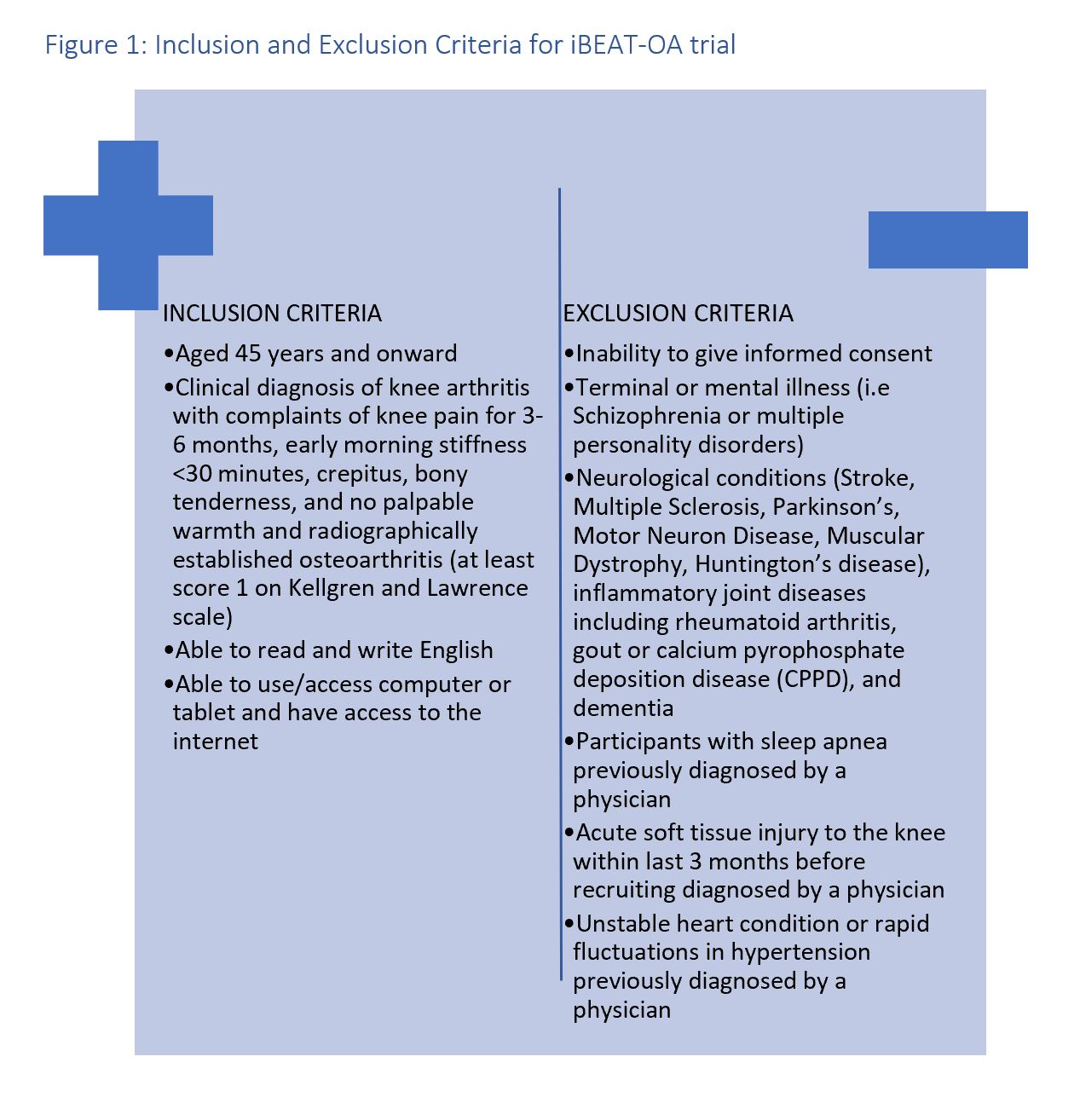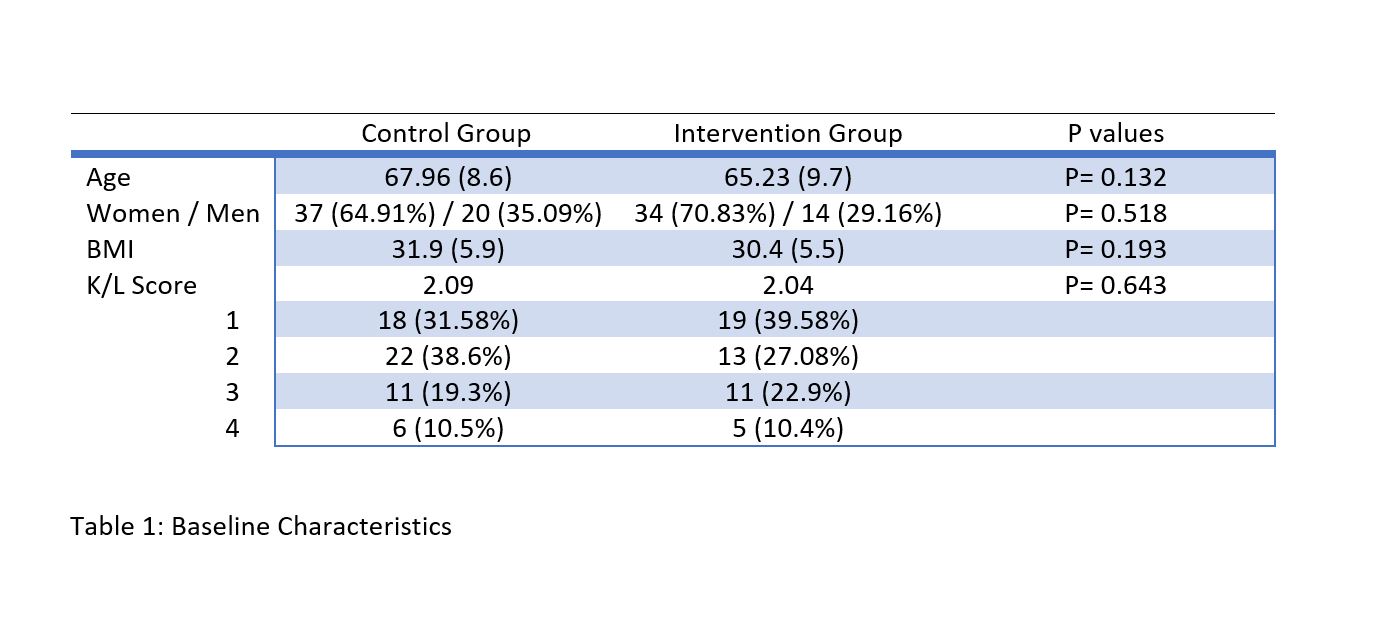Session Information
Session Type: Abstract Session
Session Time: 4:00PM-4:50PM
Background/Purpose: Osteoarthritis (OA) is the commonest cause of pain and disability in the general population and is usually managed by family doctors and physiotherapists. This study aimed to explore the benefits of digital delivery of exercises on pain, function, and other health-related outcomes in individuals with painful knee OA.
Methods: iBEAT-OA was a primary-care based randomised controlled trial in which participants with knee OA were 1:1 randomised to web-based exercises or usual care. The study was designed to ascertain whether, after 6 weeks, i-BEAT-OA was more effective to reduce the pain than continued usual care. The eligibility criteria are shown in Figure 1.
An app-based exercises platform known as Joint Academy (JA) was used as an intervention given to treatment arm. There were two face-to-face sessions with a physiotherapist for both arms, at enrolment and six weeks. Visual Analogue Score (VAS), Western Ontario and McMaster Universities Osteoarthritis Index (WOMAC), The Arthritis Research UK Musculoskeletal Health Questionnaire (MSK-HQ), Pittsburgh Sleep Quality Index (PSQI), 30-second sit to stand test (30CST), Time up and go test (TUG), Quantitative Sensory Testing (QST), Maximum Voluntary Contraction (MVC)- isokinetic contraction of Quadriceps / Hamstring muscle, urine and blood samples were taken at baseline and at six weeks follow up. Participants were given an actigraphy device.
We compared groups at baseline and after 6 weeks by intention to treat.
The primary outcome was the change in pain (mean difference) assessed by visual analogue scores (VAS) between baseline and follow-up between the treatment and control arms. The difference within arms between baseline and follow-up was assessed using a paired t-test. A similar model was used for other variables. Regression analysis models were used to assess confounding factors. The threshold for statistical significance was set at level .05 with 2-sided testing.
Results: The recruitment was stopped in March 2020 due to COVID-19 lockdown instructions. In total, 105 participants (48 participants in the intervention arm and 57 participants in the control arm) had completed data for both baseline and follow-up assessments. No significant differences in baseline characteristics were seen (Table 1).
The mean difference in pain as measured by a visual analogue scale (0-10) from baseline minus follow-up for the treatment arm was a drop of -1.79 [95%CI -1.16 to -2.41], for the control arm it was -0.39 [95%CI -0.97 to 0.18]. The mean difference between the treatment and control arms was 1.39 [95%CI 0.55-2.2] p< 0.0014 favouring the treatment arm.
Conclusion: Among participants with knee pain from OA, use of the Joint Academy app compared with control group resulted in an improvement in pain, function and muscle strength at 6 weeks follow-up that was statistically significant. Furthermore, there was improved muscle strength of hamstring and functional activities in intervention group. With COVID-19 pandemic, when social distancing is a vital prerequisite of staying safe, apps such as Joint Academy can be useful tools to manage knee OA at home.
 Figure 1: Inclusion and Exclusion Criteria for iBEAT-OA trial
Figure 1: Inclusion and Exclusion Criteria for iBEAT-OA trial
 Table 1: Baseline Characteristics
Table 1: Baseline Characteristics
To cite this abstract in AMA style:
Gohir S, Abhishek A, Kelly A, Valdes A. A Randomised Controlled Trial Evaluating the Efficacy of Internet-based Exercises Aimed at Treating Knee Osteoarthritis (iBEAT-OA) [abstract]. Arthritis Rheumatol. 2020; 72 (suppl 10). https://acrabstracts.org/abstract/a-randomised-controlled-trial-evaluating-the-efficacy-of-internet-based-exercises-aimed-at-treating-knee-osteoarthritis-ibeat-oa/. Accessed .« Back to ACR Convergence 2020
ACR Meeting Abstracts - https://acrabstracts.org/abstract/a-randomised-controlled-trial-evaluating-the-efficacy-of-internet-based-exercises-aimed-at-treating-knee-osteoarthritis-ibeat-oa/
